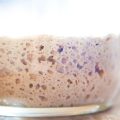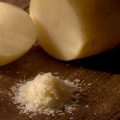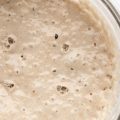Can we use a sourdough starter that smells like acetone? Your active sourdough starter goes through many changes throughout its life, what with the wild yeast and bacteria taking over. Sometimes it releases pleasant smells, whilst other times, the smells are slightly questionable. When this happens, one can only think that perhaps my sourdough starter has died! If your sourdough starter smells like acetone – or alcohol, socks, vomit, perhaps something else unpleasant entirely – then here’s what you need to do.
![Sourdough Starter Smells Like Acetone - Can You Still Use It? 1 How to make sourdough more soft [full guide]](https://www.mydailysourdoughbread.com/wp-content/uploads/2024/05/How-to-Make-Sourdough-More-Soft-Full-Guide-4-840x473.jpg)
Table of Contents
- What Should A Sourdough Starter Smell Like?
- Other Unpleasant Sourdough Scents
- What If the Smell Persists?
- Sourdough Starter Smells Like Acetone
- Sourdough Starter Smells Like Acetone FAQs
What Should A Sourdough Starter Smell Like?
Your starter should smell pleasantly sour with a touch of yeastiness. It shouldn’t smell overpowering, or nasty at all.
If your sourdough starter makes you wrinkle your nose in disgust, then throw it away.
Why Does My Starter Smell Like Acetone?
When your starter smells like acetone or nail polish remover, it’s a normal sign that it’s hungry and needs feeding. This aroma is a byproduct of fermentation, specifically the production of acetic acid, which becomes more noticeable when the starter is underfed or left to ferment too long.
If your starter is kept in a warm environment and requires feeding more than twice a day to avoid the acetone smell, consider adjusting its feeding ratio to 1:2:2 (starter:flour:water). This will provide more food for the microorganisms, preventing them from exhausting their supply too quickly.
Using chilled water when feeding your starter can also help slow down the fermentation process, allowing your starter to consume its food more gradually and preventing the rapid development of the acetone aroma. Maintain a consistent feeding schedule to keep your starter healthy, balanced, and free from unpleasant odors.
Other Unpleasant Sourdough Scents
Why Does My Starter Smell Like Old Gym Socks?
In the initial stages of creating a sourdough starter, it’s common for the mixture to develop unpleasant odors, such as the smell of old gym socks or vomit. This is a normal part of the process and should not be a cause for concern.
During the first few weeks, various bacteria and yeast strains present in the flour and environment will compete for dominance within the starter. As these microorganisms become established, they produce byproducts that can cause strong, often unpleasant odors.
However, as the starter matures, the beneficial bacteria and yeast will gradually outcompete the less desirable strains. This shift in the microbial balance will lead to a more pleasant aroma, typically described as sweet, fruity, or slightly sour. The offensive smells should dissipate once the good bacteria have taken over, creating a stable and healthy starter.
To help your starter reach this stage, it’s essential to maintain a consistent feeding schedule, providing the microorganisms with the necessary nutrients to thrive. Be patient during this initial period, and trust that the unpleasant odors are a temporary part of the process. With regular feeding and proper care, your starter will eventually develop a more appealing aroma and be ready to create delicious, flavorful sourdough bread.Cop
Why Does My Starter Smell Like Vinegar?
When your sourdough starter emits a strong vinegar aroma, it’s a clear sign that the starter is very hungry and needs immediate feeding. The vinegar smell is caused by the production of acetic acid, a byproduct of the fermentation process carried out by the bacteria and yeast in your starter.
If the starter is left unfed for too long, the concentration of acetic acid can become overpowering, resulting in a strong vinegar smell. This indicates that the microorganisms have exhausted their food supply and need fresh nutrients to maintain their health and balance.
To address a vinegar-smelling starter, feed it with equal parts fresh flour and water. This will provide the necessary nutrients for the microorganisms to continue their fermentation process and help dilute the acetic acid concentration. Maintain a regular feeding schedule, typically once or twice a day, to ensure your starter remains healthy and well-balanced.
Why Does My Starter Smell Like Alcohol?
If your sourdough starter smells like alcohol, don’t panic!
This distinct aroma is a natural byproduct of the fermentation process. When yeast in your starter consumes sugars and starches, it produces ethanol (alcohol) and carbon dioxide. Bacteria convert some of the ethanol into acetic acid, contributing to sourdough’s tangy flavor.
An alcohol smell isn’t usually a cause for concern, but an overwhelmingly strong smell and watery consistency may indicate an underfed starter. Establish a consistent feeding schedule to maintain a healthy starter and prevent excessive ethanol production.
If your neglected starter has developed a strong alcohol smell, discard all but a small portion and give it a generous feeding of equal parts flour and water. Repeat every 12-24 hours until your starter is bubbly and active again.
Why Does My Starter Smell Like Cheese?
If your sourdough starter has a distinct cheesy aroma, don’t worry—it’s not spoiled!
This peculiar scent is actually a sign that your starter is teeming with beneficial lactic acid bacteria, particularly lactobacillus. These tiny microorganisms are the unsung heroes of the sourdough world, working tirelessly to create that signature tangy flavor we all love.
Lactic acid bacteria, such as lactobacillus, are essential for the fermentation process in sourdough. As they feast on the sugars in the flour, they produce lactic acid as a byproduct. This lactic acid is responsible for the sour taste and cheesy aroma that sometimes emanates from your starter. The distinct cheese odor is a result of the lactic acid fermentation process, which is crucial for developing the complex flavors in sourdough bread.
If your sourdough starter smells like aged cheddar or parmesan, consider it a badge of honor! It means your starter is thriving and filled with healthy, cheese-loving bacteria. Embrace the funky fragrance and know that it will translate into a deliciously tangy loaf of bread.
While a cheesy sourdough starter is perfectly normal, if the scent becomes overpowering, there are ways to balance it out. Feeding your starter more frequently or adjusting the ratio of flour to water can help keep the lactic acid smell in check.
Remember, a little cheesiness goes a long way in creating a flavorful sourdough loaf!

What If the Smell Persists?
If you’ve been faithfully feeding your sourdough starter, but that strong acetone aroma just won’t quit, it might be time to consider other options. While an occasional whiff of nail polish remover is nothing to worry about, a persistent smell could indicate deeper issues with your starter’s health.
When to Start Over with a New Starter
In some cases, the best course of action is to bid farewell to your current starter and begin anew. If you notice any signs of mold or contamination, such as fuzzy growth or discoloration, it’s definitely time to toss that starter out. Don’t risk using a compromised starter, as it could lead to subpar bread or even make you sick.
Another red flag is if your starter consistently fails to double in size after feedings, despite your best efforts. This could suggest that the balance of yeast and bacteria is off-kilter, preventing your starter from thriving. Starting from scratch with fresh flour and water might be the key to sourdough success.
Troubleshooting Tips for a Smelly Starter
Before you give up on your smelly starter, there are a few things you can try. First, make sure you’re using high-quality, unbleached flour for feedings. Some flours may contain additives that can disrupt the delicate balance of microorganisms in your starter.
You can also try moving your starter to a cooler spot in your kitchen. If it’s been sitting in a warm, humid area, the excess heat could be causing the yeast to work overtime, leading to that strong acetone odor. A cooler environment may help keep things in check.
Sourdough Starter Smells Like Acetone
A smelly sourdough starter doesn’t necessarily mean a bad sourdough starter. Simply feed and shower it with love, and it’ll be good to go.
Sourdough Starter Smells Like Acetone FAQs
Can I Use My Sourdough Starter If It Smells Like Acetone?
Yes, absolutely. Your starter may develop some smells, akin to nail polish remover or acetone. This is perfectly normal and is an indicator that your starter is hungry.
Can You Eat Sourdough That Smells Like Acetone?
Yes. The acetone smells aren’t harmful to your body, in fact, the starter is in perfect condition, rather it requires some additional feedings, thanks to its production of acetic acid.
Why Does My Sourdough Starter Smell Like Polish Remover?
If your starter smells like alcohol, vinegar, or nail polish remover, it’s an indicator that your starter is really hungry and has produced acetic acids.
Why Does My Dough Smell Like Acetone?
The acetone smell is an indication of a very hungry starter, the yeast having engulfed all of their food.

![Sourdough Starter Temperature [Beginner'S Guide] 3 Sourdough starter temperature [a beginner’s guide]](https://www.mydailysourdoughbread.com/wp-content/uploads/2023/01/blog-images-48-120x120.jpg)



